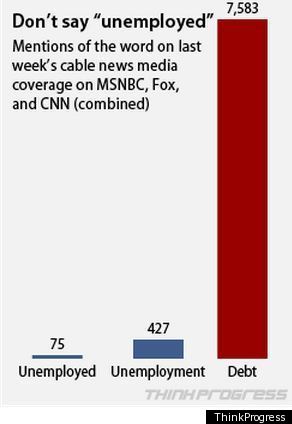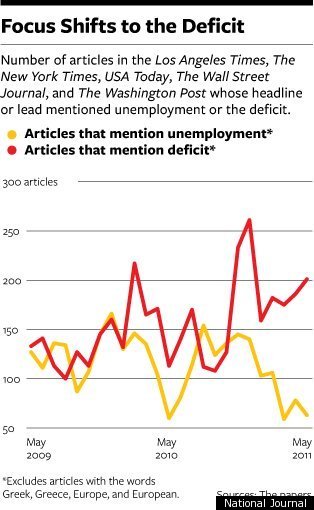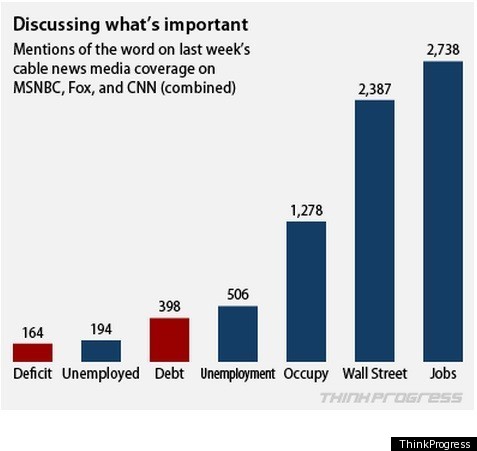
Two weeks ago, as the rest of the media struggled to surmise what the "demands" of the Occupy Wall Street demonstrators were, I offered that their agenda -- for lack of a better term -- seemed to begin with two demands. The first was "acknowledge our existence." The second was "make a nominal investment to covering what is happening in our lives." Historically, this has been a tall order -- if there's one thing the media has excelled at in the past few years, it's been ignoring the multiple crises in which the larger population of ordinary Americans find themselves embroiled, specifically income inequality and unemployment. But there's evidence that the Occupy Wall Street movement is actually starting to change this, and that the media is starting to pay attention.
I'll direct your attention to some sharp work by Zaid Jelani over at Think Progress, who did a spotlight survey of two months worth of cable news coverage looking for what subjects dominated the airwaves. He begins in July 2011, where "the word 'debt' was mentioned more than 7,000 times on MSNBC, CNN, and Fox News, and 'unemployed' was only mentioned 75 times."

One day, we're going to look back on the late spring/early summer as a time of widespread journalistic failure. At the time, the Beltway Deficit Feedback Loop was running at maximum speed and the obsession was deeply entrenched. The absurd notion that a political party could attempt to leverage demands by threatening to send the United States into default and set off a cataclysm within the interconnected global economy therefore got covered as just another interesting point of view, rather than pure sociopathy. At the time, it was increasingly common to see ordinary Americans, expressing themselves through polls, urging action on the unemployment crisis. But it was just as common for the press to juke the stats to fit their preferred narrative -- and at the time, the press was freebasing pure, uncut deficit hysteria.
The National Journal noted the extremity of this media obsession with a chart of their own:

Back then, even some people who were willing to mildly criticize the media on this score ended up choking on apologies and excuses. The best the Atlantic's Derek Thompson could offer was: "The press was partly complicit in this fade-out effect. But it's hard to blame the media too much for resisting to write feverishly about nonexistent efforts to fix a static unemployment problem." Translation: if lawmakers aren't doing anything to fix unemployment, it's hard to make a story out of it, and we're not willing to try.
With lawmakers diddling one another in deficit committees and members of the media denying their own agency, someone had to step up. And that someone ended up being the Occupy Wall Street movement. Their human-flesh social network took up physical space on the ground and started telling their own stories, using Tumblr as their means of aggregation. So we flash ahead to Jelani's analysis of cable news coverage from the past seven days, and voila -- suddenly it's starting to align with the sentiment that was too easily dismissed when it showed up in polls several months ago:
A ThinkProgress review of the same three networks between Oct. 10 and Oct. 16 finds that the word "debt" only netted 398 mentions, while "occupy" grabbed 1,278, Wall Street netted 2,378, and jobs got 2,738.

The clearest affirmation of the idea that this movement has sparked a change in coverage came in the run-up to last night's CNN debate, when David Gergen opined, "These Occupy Wall Street demonstrations, and they're spreading, they're starting to be taken more seriously by the mainstream media. They're starting to put on the table the issue of inequality ... I think it's a legitimate set of conversations." My immediate thought was, "Hooray! It's finally 'legitimate' for the media to discuss something that's been a crippling problem in the country for the past few years!"
Nevertheless, all of this points to the fact that the Occupy Wall Street protesters can already consider themselves to be something of a success. It takes a mighty force to interrupt the media's preferred narrative, and for the moment, they are it.
READ THE WHOLE THING:
CHART: Thanks To The 99 Percent Movement, Media Finally Covering Jobs Crisis And Marginalizing Deficit Hysteria [ThinkProgress]
PREVIOUSLY, on the HUFFINGTON POST:
The Media Has Abandoned Covering The Nation's Massive Unemployment Crisis
[Would you like to follow me on Twitter? Because why not? Also, please send tips to tv@huffingtonpost.com -- learn more about our media monitoring project here.]
